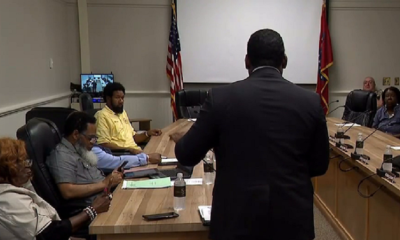Arkansas
Arkansas is the only state where overdue rent can lead to an arrest warrant

HOT SPRINGS, Ark. — The national spotlight is back on Arkansas and the notorious way evictions are handled in this state. We remain the only state where being late with rent can lead to an arrest warrant and in rare cases a trip to jail.
A recent article by the non-profit journalism group Pro Publica pointed out that many landlords take advantage of a law on the books that puts eviction cases in criminal court.
Landlords in parts of the state often go that route, thinking the jail part is so rare it never really happens, but even in the middle of the coronavirus pandemic, a handful of cases show that if both parties don’t work together, it can— and does.
There are perhaps thousands in Arkansas facing that worry as the pandemic wears on, leading advocates to help troubled tenants find a way through the worry.
“If a tenant is in danger of being evicted they need to be proactive,” said Lynn Foster, a professor at the UALR Bowen School of Law who has tracked thousands of eviction cases over the years.
She has closely followed trends this year as safety nets start to fray.
“What I’m seeing is that in September the number of evictions filed surpassed the number from September of last year,” she said, which points to the biggest pinch facing landlords right now.
“Loss of rent and collecting rent,” said Steve Webster, the president of the Hot Springs Landlord Association of the biggest challenge his members face in 2020.
Webster bristles at the characterization national articles often put on Arkansas landlords who use the criminal eviction statute. He said his organization is about 100 members who control some 5,000 properties.
Using criminal courts offers small-scale landlords a cheaper way to resolve rent disputes, and almost always results in a clean record.
“We’ve always looked for other ways to come up with an eviction process, but it is a law on the books, so we use it,” Webster said. “Usually, we get to court and tell the judge ‘hey, they moved out. They did what they said. We’re good.’ In that case, it’s done right there.
But Foster thinks both the criminal and civil procedures need work. Efforts to find better solutions come up in nearly every legislative session, often with landlords like Webster working together with advocates.
In 2019, a renters’ rights bill died in a legislative committee.
With several months and an election to go before solutions could come up again, Foster has some things you need to do now while we wait.
“If you are a tenant facing eviction, call the legal services helplines and see if you can’t get some assistance from somebody,” she said, noting that bringing a lawyer to any kind of housing case helps, but few tenants in that situation can afford one.
She recommends two legal aid groups: Legal Aid of Arkansas and Arkansas Legal Services, who can at least point people in the right direction.
After a limited program ran its course earlier this year, a new rental assistance program is scheduled to come online in early November.
“The qualification level has been raised so many more tenants will be able to qualify for this assistance,” said Foster. “It will also cover up to 2 and a half months of rent.”
But the biggest advice from both sides of the transaction is to face the problem and not to run from it.
The Centers for Disease Control placed a moratorium on evictions across the country if the pandemic caused the renter to get behind.
A form is available online, but the landlord needs to be involved.
“Read it. Make sure it applies to them. Fill it out. Sign it. Give it to their landlord. Keep a copy of it,” said Foster.
-

 Local News2 weeks ago
Local News2 weeks agoArkansas State Police seize over 4,000 pounds of illegal drugs in highway traffic stops
-

 Local News2 weeks ago
Local News2 weeks agoLittle Rock and North Little Rock will see lane restrictions along Interstate 30
-

 Local News2 weeks ago
Local News2 weeks agoSeveral recently painted murals in Little Rock’s downtown
-

 Local News2 weeks ago
Local News2 weeks ago$20 million grants will be funded by the Arkansas Department of Human Services for pilot project
-

 Local News1 week ago
Local News1 week agoJefferson County is dysfunctional due to a dispute between the judge and justices
-

 Local News2 weeks ago
Local News2 weeks agoA church in Fredonia becomes a museum with a mission of conserving African American history
-

 Local News5 days ago
Local News5 days agoMay Fest 2024 promises a joyful street
-

 Local News2 weeks ago
Local News2 weeks agoThe 50th season of the Little Rock Farmers Market begins





Leave a Reply